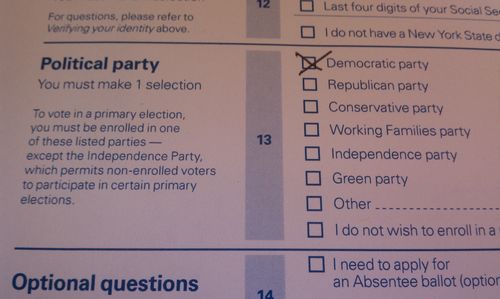NEW YORK DAILY NEWS
October 8, 2012
Why I’m becoming a Democrat
by James Panero
I am an upper West Sider, born and raised. In the most liberal district in the country, I was brought up by the most liberal parents in the entire district. Or so it seemed — I may not have been a red diaper baby, but my diaper was unmistakably pink.
Yet my own politics, early on, took a very different turn, and so I have never voted like an upper West Sider. Call it the consequences of red diaper rash. Or waking up to the bad effects of so much do-goodery. I’ve long believed that radical politics have destroyed the neighborhood I love most.
So why, for the first time, am I registering as a Democrat? Because I want to have a say in the future of my city in the sweeping 2013 elections, where we will vote on a new City Council, a new mayor and a slew of other local offices.
Everyone who wants his or her voice heard should do the same. Just log onto the New York State Board of Elections homepage and fill out a form. Trust me, I’m far from thrilled about it. My politics certainly haven’t changed; I just want my politics to change the city for the better.
Fact is, most of the city’s next round of elected officials will be determined in the 2013 Democratic primaries — in which only registered Democrats can have a say. And only Democrats (and those Republicans and independents in the city who re-register as Democrats before the deadline of Oct. 12) can influence these elections.
In heavily Democratic districts such as the upper West Side, Democrats for local offices are sure to win the general election. The only real voter choice will therefore occur at the primary level. Right now, things don’t look all that different for the mayor’s race, either.
The Democratic machine has long benefited from this narrowing of the voting base. Local candidates emerge from the backrooms of a handful of entrenched Democratic clubs. By mobilizing the party fringe, these clubs then get their candidates on the general ballot.
That’s why New York’s primary laws are some of the most restrictive in the country. The party bosses don’t want to hear from us. Where other states allow voters to declare party affiliation on the day of a primary, New Yorkers must do it a year ahead, when few are focused on the upcoming election.
This time around, let’s prove them wrong. We live in a city where 68% of voters are registered Democrats, outnumbering Republicans 6 to 1. That ratio is even higher in districts like mine. That means that once on the ballot, the Democratic candidate could be the embalmed remains of Boss Tweed and still win. At the same time, the non-Dem voice, with its moderate and conservative points of view, is always silenced in the general election.
Yet in primary races, where only a small number of votes are split among several candidates, that non-Dem voice could be significant — if only we had a vote to cast.
In my district, there are currently 80,000 registered Democrats, 13,000 Republicans and 20,000 nonregistered independents. Considering that fewer than 20,000 voters usually turn out for the Democratic primaries for local office, a push of newly minted Democratic voters from the Republican and independent rolls could make a huge difference.
For decades, the radical fringe has held a lock on my City Council seat. Back in 2009, City Council members struck a bargain with Mayor Bloomberg to give themselves third terms, but after 12 years, the term limits on these seats are finally coming due.
In 2013, we will have an open Democratic primary race for the first time since 2001. Already in my district, it looks like several candidates plan to run, offering a range of positions and opinions. Some are moderates. Others are old-line liberals.
For once, the choice doesn’t have to be made by a few geriatric radicals holed up in the neighborhood’s last rent-controlled classic six apartments. If the Republicans and independents in my district added their votes to the existing Democratic moderates, the results could turn the corner on the neighborhood’s legacy of bad politics.
Registration doesn’t mean losing principles. It means making principles count in the voting booth.
We can still donate to the candidate of our choice, volunteer for our favorite political parties and cast our lot for anybody who makes it into the general election.
Call it strategic affiliation. It’s something our current mayor certainly understands, having gone from a Democrat to a Republican to an independent.
We don’t necessarily have to believe in the Democratic Party to vote in the Democratic primary. We just have to register as Democrats and believe in democracy.
UPDATE: NY1 interviews me about the switch: "Some NYC Voters Want to Switch Parties to Vote in Democratic Primaries," by Grace Rauh (October 9, 2012)
